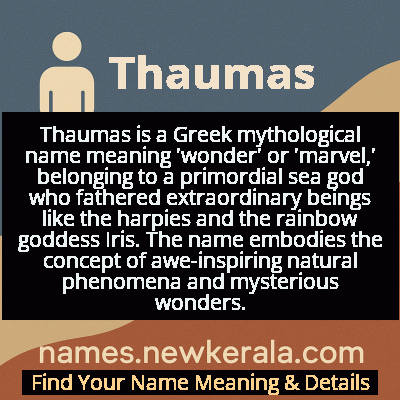Thaumas Name Meaning & Details
Origin, Popularity, Numerology Analysis & Name Meaning of Thaumas
Discover the origin, meaning, and cultural significance of the name THAUMAS. Delve into its historical roots and explore the lasting impact it has had on communities and traditions.
Name
Thaumas
Gender
Male
Origin
Greek
Lucky Number
2
Meaning of the Name - Thaumas
Thaumas is a Greek mythological name meaning 'wonder' or 'marvel,' belonging to a primordial sea god who fathered extraordinary beings like the harpies and the rainbow goddess Iris. The name embodies the concept of awe-inspiring natural phenomena and mysterious wonders.
Thaumas - Complete Numerology Analysis
Your Numerology Number
Based on Pythagorean Numerology System
Ruling Planet
Moon
Positive Nature
Diplomatic, friendly, artistic, empathetic.
Negative Traits
Over-sensitive, moody, indecisive, prone to self-pity.
Lucky Colours
Green, cream, white.
Lucky Days
Monday.
Lucky Stones
Pearl, moonstone.
Harmony Numbers
1, 3, 4.
Best Suited Professions
Diplomats, mediators, caregivers, artists.
What People Like About You
Cooperative spirit, friendliness, artistic talent.
Famous People Named Thaumas
Thaumas of Athens
Ancient Greek Poet
Wrote lost epic poems about marine deities and mythical creatures
Thaumas Alexandrou
Byzantine Scholar
Preserved and commented on classical Greek mythological texts
Thaumas Papadopoulos
Modern Greek Artist
Renowned for surreal marine-themed paintings inspired by Greek mythology
Name Variations & International Equivalents
Click on blue names to explore their detailed meanings. Gray names with will be available soon.
Cultural & Historical Significance
The cultural significance of Thaumas extends beyond his role as a sea god to his importance as a progenitor of remarkable beings. As father of the Harpies (storm spirits who personified destructive winds) and Iris (the rainbow goddess who served as messenger to the gods), Thaumas connected the marine world with atmospheric phenomena. This paternal role established him as a source of natural wonders that bridged different realms of existence. In Greek thought, Thaumas represented the concept that wonder and marvel were fundamental forces in the universe, born from the union of sea and earth, and manifesting in both destructive and beautiful forms throughout nature.
Extended Personality Analysis
Individuals bearing the name Thaumas are often characterized by their profound capacity for wonder and their deep appreciation for life's mysteries. Like their mythological namesake who personified marvel, they tend to be curious, imaginative souls who find beauty and fascination in the world around them. They often possess an artistic or philosophical temperament, with a natural inclination toward exploring the unknown and appreciating the extraordinary in ordinary life. Their personality typically combines depth with a certain elusive quality, making them both intriguing and somewhat enigmatic to others.
Those named Thaumas frequently exhibit a dual nature that reflects their mythological connection to both terrifying harpies and beautiful rainbows. They can display remarkable adaptability, shifting between intense passion and serene contemplation as circumstances demand. This complexity makes them fascinating companions who often surprise others with unexpected insights and perspectives. They tend to be creative problem-solvers who approach challenges with unique viewpoints, and they often serve as bridges between different groups or ideas, much like their namesake connected sea and sky through his remarkable children.
Modern Usage & Popularity
In contemporary naming practices, Thaumas remains an exceptionally rare choice, primarily favored by parents with strong interests in classical mythology or those seeking distinctive names with deep cultural roots. Its usage is most prominent in Greece and among Greek diaspora communities, though it occasionally appears in other countries among classical scholars, artists, or mythology enthusiasts. The name has experienced a modest resurgence since the early 21st century, coinciding with increased popular interest in Greek mythology through literature, films, and video games. However, it remains well outside mainstream naming trends and is typically chosen by parents who value uniqueness, cultural significance, and literary appeal over popularity. Its rarity makes it a bold choice that conveys sophistication and a connection to classical traditions.
Symbolic & Spiritual Meanings
Symbolically, Thaumas represents the fundamental human experience of wonder and awe when confronted with the extraordinary and inexplicable. The name embodies the concept that marvel is not just an emotional response but a fundamental force in the universe, born from the union of elemental powers. As the personification of wonder, Thaumas symbolizes the boundary between the known and unknown worlds, representing both the beauty and terror that can arise from encountering phenomena beyond ordinary comprehension. His mythological role as father to both destructive harpies and beautiful Iris makes him a powerful symbol of life's inherent dualities - how wonder can encompass both creation and destruction, chaos and order, in equal measure. This symbolic richness positions Thaumas as representing the complete spectrum of marvelous experience, from terrifying storms to breathtaking rainbows.

